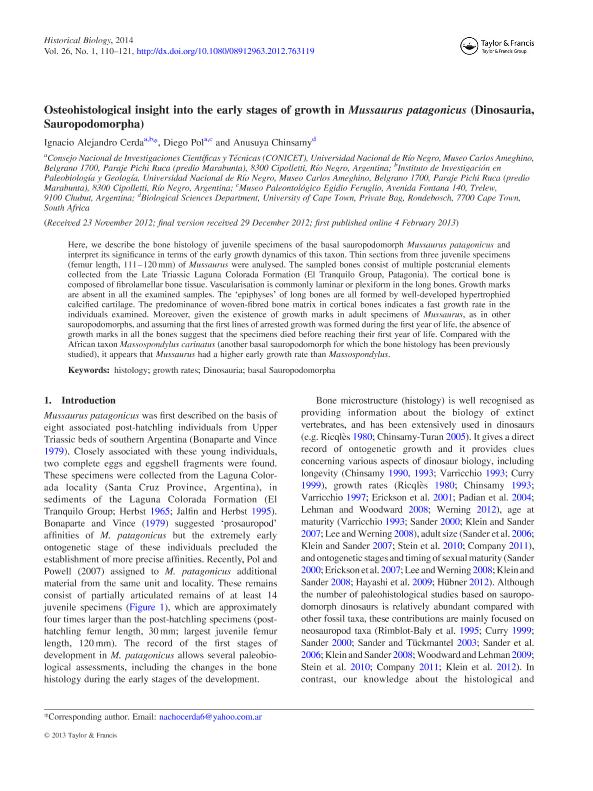Mostrar el registro sencillo del ítem
dc.contributor.author
Cerda, Ignacio Alejandro

dc.contributor.author
Chinssamy, Anusuya

dc.contributor.author
Pol, Diego

dc.date.available
2017-05-26T17:58:36Z
dc.date.issued
2014
dc.identifier.citation
Cerda, Ignacio Alejandro; Chinssamy, Anusuya; Pol, Diego; Osteohistological insight into the early stages of growth in Mussaurus patagonicus (Dinosauria, Sauropodomorpha); Taylor & Francis; Historical Biology; 26; 1; -1-2014; 110-121
dc.identifier.issn
0891-2963
dc.identifier.uri
http://hdl.handle.net/11336/16964
dc.description.abstract
Here, we describe the bone histology of juvenile specimens of the basal sauropodomorph Mussaurus patagonicus and interpret its significance in terms of the early growth dynamics of this taxon. Thin sections from three juvenile specimens (femur length, 111-120 mm) of Mussaurus were analysed. The sampled bones consist of multiple postcranial elements collected from the Late Triassic Laguna Colorada Formation (El Tranquilo Group, Patagonia). The cortical bone is composed of fibrolamellar bone tissue. Vascularisation is commonly laminar or plexiform in the long bones. Growth marks are absent in all the examined samples. The epiphyses of long bones are all formed by well-developed hypertrophied calcified cartilage. The predominance of woven-fibred bone matrix in cortical bones indicates a fast growth rate in the individuals examined. Moreover, given the existence of growth marks in adult specimens of Mussaurus, as in other sauropodomorphs, and assuming that the first lines of arrested growth was formed during the first year of life, the absence of growth marks in all the bones suggest that the specimens died before reaching their first year of life. Compared with the African taxon Massospondylus carinatus (another basal sauropodomorph for which the bone histology has been previously studied), it appears that Mussaurus had a higher early growth rate than Massospondylus.
dc.format
application/pdf
dc.language.iso
eng
dc.publisher
Taylor & Francis

dc.rights
info:eu-repo/semantics/openAccess
dc.rights.uri
https://creativecommons.org/licenses/by-nc-sa/2.5/ar/
dc.subject
Histology
dc.subject
Growth Rates
dc.subject
Dinosauria
dc.subject
Basal Sauropodomorpha
dc.subject.classification
Paleontología

dc.subject.classification
Ciencias de la Tierra y relacionadas con el Medio Ambiente

dc.subject.classification
CIENCIAS NATURALES Y EXACTAS

dc.title
Osteohistological insight into the early stages of growth in Mussaurus patagonicus (Dinosauria, Sauropodomorpha)
dc.type
info:eu-repo/semantics/article
dc.type
info:ar-repo/semantics/artículo
dc.type
info:eu-repo/semantics/publishedVersion
dc.date.updated
2016-12-12T14:29:56Z
dc.identifier.eissn
1029-2381
dc.journal.volume
26
dc.journal.number
1
dc.journal.pagination
110-121
dc.journal.pais
Reino Unido

dc.journal.ciudad
Londres
dc.description.fil
Fil: Cerda, Ignacio Alejandro. Consejo Nacional de Investigaciones Científicas y Técnicas; Argentina. Universidad Nacional de Rio Negro; Argentina. Museo Carlos Ameghino; Argentina
dc.description.fil
Fil: Chinssamy, Anusuya. University of Cape Town; Sudáfrica
dc.description.fil
Fil: Pol, Diego. Consejo Nacional de Investigaciones Científicas y Técnicas; Argentina. Museo Paleontológico Egidio Feruglio; Argentina
dc.journal.title
Historical Biology
dc.relation.alternativeid
info:eu-repo/semantics/altIdentifier/doi/http://dx.doi.org/10.1080/08912963.2012.763119
dc.relation.alternativeid
info:eu-repo/semantics/altIdentifier/url/http://www.tandfonline.com/doi/abs/10.1080/08912963.2012.763119
Archivos asociados
